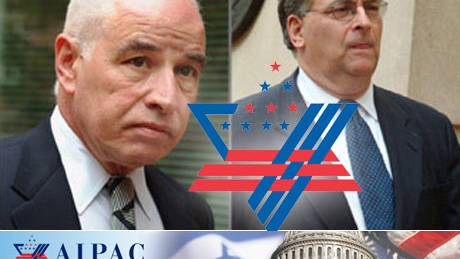U.S. Drops Case Against Ex- AIPAC Lobbyists
Source: washingtonpost.com

Steve Rosen, left, and Keith Weissman, right
Former AIPAC Employees Faced Espionage Charges
Federal prosecutors yesterday abandoned an espionage-law case against two former lobbyists for a pro-Israel advocacy group, a case that had transfixed much of official Washington because of its potential to criminalize the exchange of sensitive information among journalists, lobbyists and policy analysts.
In asking a judge to dismiss charges against Steven J. Rosen and Keith Weissman, formerly of the American Israel Public Affairs Committee, or AIPAC, officials said recent court rulings had changed the legal landscape and made it unlikely that they would win.
Prosecutors and investigators had used FBI wiretaps to pursue Rosen and Weissman for at least five years, building a complex case that involved secret court hearings and dozens of legal filings and rulings. The two men were charged in 2005 with conspiring to obtain classified information -- about topics including al-Qaeda and U.S. forces in Iraq -- and pass it to the Israeli government and journalists from The Washington Post and other news organizations.
Rosen and Weissman were the first civilians not employed by the government charged under the 1917 espionage statute.
"Thank God we live in a country where you can defend yourself against an injustice like this," Rosen, 66, said yesterday. He said the case was politicized and pushed by government officials "who have an obsession with leaks . . . and an obsession with Israel and the theory that it spies on America."
The case was not a total loss for the government. A former Pentagon analyst, Lawrence A. Franklin, pleaded guilty in 2005 to passing government secrets to Rosen and Weissman. He was sentenced to more than 12 years in prison.
Lawyers for Rosen and Weissman attributed the withdrawal of the case in part to the Obama administration. "We are extremely grateful that this new Administration . . . has taken seriously their obligation to evaluate cases on the merits," the lawyers, Abbe D. Lowell, John Nassikas and Baruch Weiss, said in a statement.
But David Szady, who was the FBI's assistant director for counterintelligence when the case was brought, said politics was not a factor in the decisions to file charges or to withdraw them. "If you commit espionage against the United States, the FBI has an obligation to investigate that, regardless of the political fires around it, and we're blind to whatever country may be involved," Szady said.
Recent pretrial rulings made the case difficult for the government, including an appeals court ruling that allowed the defense to use "national defense information" at trial. A lower-court judge also said prosecutors must show that the two men knew that the information they allegedly disclosed would harm the United States or help a foreign government -- a high burden for prosecutors.
Officials said FBI agents opposed the decision, believing they had a strong case. Joseph Persichini Jr., assistant director in charge of the FBI's Washington field office, said yesterday that the case's end was "disappointing," but he commended the work of the agents.
The decision to drop the case was welcomed by AIPAC, long an influential presence in Washington because of its close ties to policymakers, think tanks and lawmakers. The group had distanced itself from Rosen and Weissman, formally firing them in 2005, but spokesman Patrick Dorton yesterday called the decision "a great day" for the defendants and their families.
AIPAC's critics had seized on the allegations against the two lobbyists as fresh evidence that the group had aligned itself so closely with the Israeli government that it was acting on that country's behalf. Supporters of the group said they were mystified by the case, noting that collecting information from government officials and sharing it with others, including governments with embassies in Washington, is a highly profitable local business.
The outcome left wider opinions about AIPAC and its influence largely unchanged. Jon B. Alterman, director of the Middle East program at the Center for Strategic and International Studies, said he had never found the case to be particularly revealing about AIPAC. "I thought it was an unusual action by the government," he said.
Gary Wasserman, a professor of government at Georgetown University who is writing a book about the case, said he was not surprised that AIPAC was pleased by the proposed dismissal. A trial, he added, "would have provoked a lot of public discussion about how they worked."
Staff reporters R. Jeffrey Smith and Carrie Johnson and research editor Alice Crites contributed to this report.
Source: washingtonpost.com
Barack Obama at AIPAC
Senator Clinton Addresses AIPAC Policy Conference 2008
Hillary: Obama Will Be A Good Friend To Israel
Senator Clinton Addresses AIPAC Policy Conference 2008
Hillary: Obama Will Be A Good Friend To Israel






















